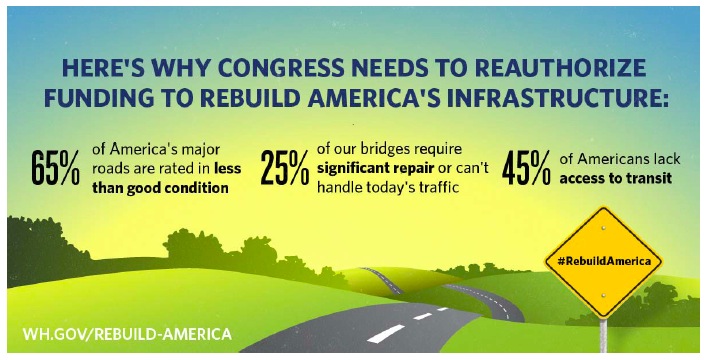THE WHITE HOUSE: NATIONAL ECONOMIC COUNCIL & THE PRESIDENT’S COUNCIL OF ECONOMIC ADVISORS
Executive Summary
A high quality transportation network is vital to a top performing economy. Investments by previous generations of Americans – from the Erie Canal in 1807, to the Transcontinental Railroad in 1869, to the Interstate Highway System in the 1950s and 1960s – were instrumental in putting the country on a path for sustained economic growth, productivity increases, an unrivaled national market for good and services, and international competitiveness. But today, current estimates indicate that America’s transportation infrastructure is not keeping pace with demands or the needs of our growing economy, for today or for future generations.
A well‐performing transportation network keeps jobs in America, allows businesses to expand, and lowers prices on household goods to American families. It allows businesses to manage their inventories and transport goods more cheaply and efficiently as well as access a variety of suppliers and markets for their products, making it more cost‐effective for manufacturers to keep production in or move production to the United States. American families benefit too: as consumers, from lower priced goods; and as workers, by gaining better access to jobs.
The economic benefits of smart infrastructure investment are long‐term competitiveness, productivity, innovation, lower prices, and higher incomes, while infrastructure investment also creates many thousands of American jobs in the near‐term.
- Today there are more than 4 million miles of road, 600,000 bridges, and 3,000 transit providers in the U.S. And yet, over the past 20 years, total federal, state, and local investment in transportation has fallen as a share of GDP – while population, congestion, and maintenance backlogs have increased.
- The U.S. lags behind many of its overseas competitors in transportation infrastructure investment. In the most recent World Economic Forum rankings, the U.S. had in less than a decade fallen from 7th to 18th overall in the quality of our roads.
- 65 percent of America’s major roads are rated in less than good condition, one in four bridges require significant repair or cannot handle today’s traffic, and forty five percent of Americans lack access to transit.
The costs of inadequate infrastructure investment are exhibited all around us. Americans spend 5.5 billion hours in traffic each year, costing families more than $120 billion in extra fuel and lost time. American businesses pay $27 billion a year in extra freight transportation costs, increasing shipping delays and raising prices on everyday products. Underinvestment impacts safety too. There were 32,000 traffic fatalities last year alone and roadway conditions are a significant factor in approximately one‐third of traffic fatalities. Such fatalities occur disproportionately in rural America, in part because of inadequate road conditions.
That’s why the President introduced the GROW AMERICA Act, a four‐year, $302 bill to fund our nation’s transportation system and invest in the nation’s future growth. The President’s plan addresses the nation’s significant infrastructure investment gap through targeted investments now and lays the groundwork for increased efficiency in the future. The President has been pressing Congress to act to avoid a lapse in funding of the Highway Trust Fund which will go insolvent as early as August, putting numerous active projects at risk.
Download full version (PDF): An Economic Analysis of Transportation Infrastructure Investment
About the National Economic Council
www.whitehouse.gov/administration/eop/nec
The National Economic Council (NEC) was established in 1993 to advise the President on U.S. and global economic policy. It resides within the Office of Policy Development and is part of the Executive Office of the President. By Executive Order, the NEC has four principal functions: to coordinate policy-making for domestic and international economic issues, to coordinate economic policy advice for the President, to ensure that policy decisions and programs are consistent with the President’s economic goals, and to monitor implementation of the President’s economic policy agenda.
Tags: National Economic Council, Obama Administration, The White House







 RSS Feed
RSS Feed